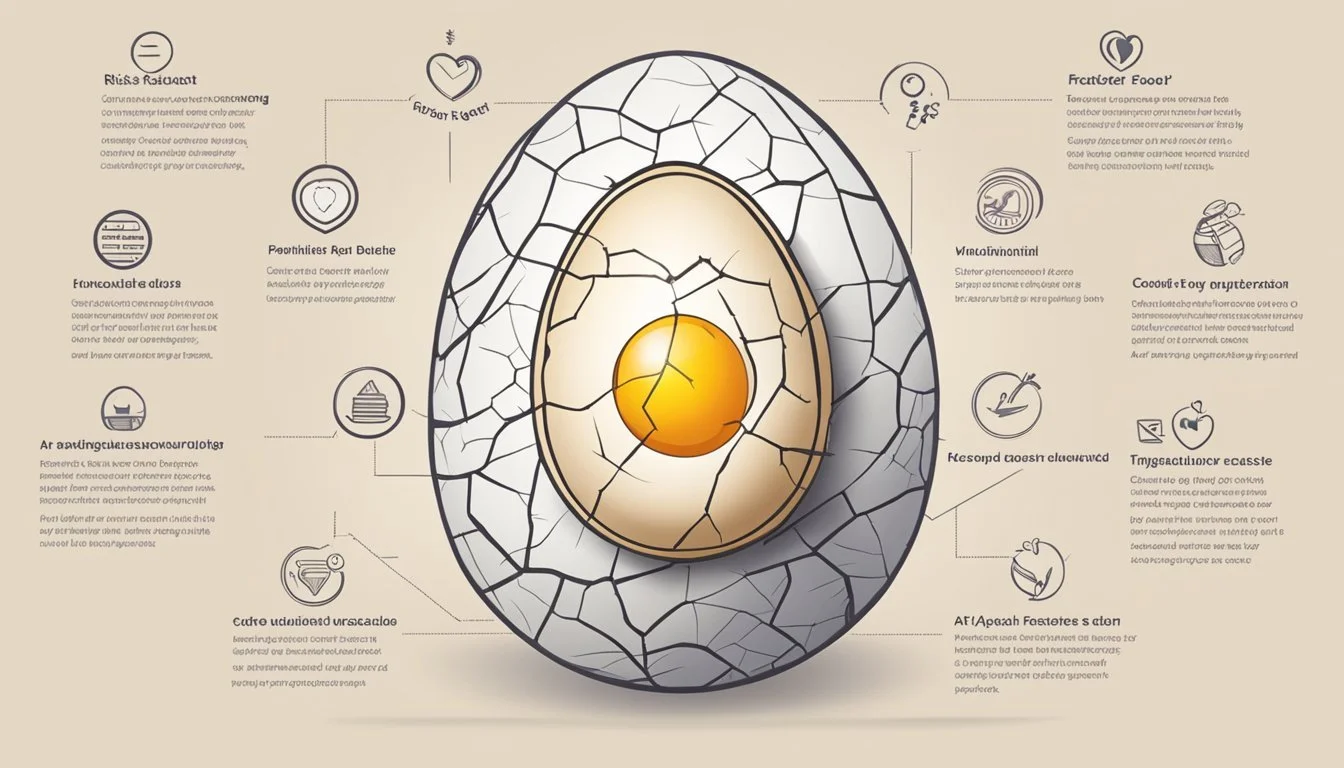Are Eggs Bad for Your Heart Health?
Debunking Myths with Facts
Eggs, a staple in many diets, have been at the center of a long-standing debate regarding their effects on heart health. The crux of the controversy stems from the cholesterol content in egg yolks, with dietary cholesterol historically being viewed as a contributing factor to heart disease. It's important to note, however, that recent research indicates the relationship between egg consumption and cardiovascular health is more complex than once thought. While eggs do contain cholesterol, they also offer a variety of essential nutrients, such as protein, vitamins D and B12, and choline, which plays a crucial role in metabolism and liver function.
The understanding of how cholesterol from eggs influences the body has evolved. It has been observed that for many individuals, consuming an egg per day does not necessarily lead to an increased risk of heart attack, stroke, or other cardiovascular diseases. The potential impact on heart health may significantly depend on the overall dietary pattern and the presence of other sources of saturated fat in the diet. Furthermore, eggs contribute beneficial nutrients that can be part of a balanced and heart-healthy diet.
When addressing the specific concerns of individuals with heart disease or high cholesterol levels, moderation becomes key. Some studies suggest that the cholesterol in eggs might not markedly affect blood cholesterol as much as once believed, particularly in the context of a low-cholesterol diet. While it's recommended to monitor egg yolk intake in these cases, egg whites provide a cholesterol-free option that still retains the high-quality protein content, along with other nutrients. As always, those with health concerns should consult a healthcare provider or a dietitian to understand how eggs fit into their personal health plan.
Understanding Cholesterol
Cholesterol plays a critical role in body function, but its management is essential for heart health. Imbalances in cholesterol levels are a known risk factor for heart disease.
Cholesterol and Heart Health
Cholesterol is a waxy substance present in the blood. High levels of the bad LDL cholesterol can lead to plaque buildup in arteries, increasing the risk of heart disease and stroke. Conversely, high levels of the good HDL cholesterol can help carry cholesterol away from the arteries.
Dietary Cholesterol vs. Blood Cholesterol
Not all cholesterol is created equally. There's a distinction between dietary cholesterol, consumed through foods like eggs, and blood cholesterol, naturally produced by the liver and circulating in the bloodstream. The body's response to dietary cholesterol varies among individuals, but in general, dietary cholesterol has a lesser effect on blood cholesterol levels than once believed.
Role of the Liver in Cholesterol Regulation
The liver acts as a central hub for cholesterol management. It not only produces blood cholesterol but also removes excess from the body. The liver adjusts the amount of cholesterol it makes based on dietary intake—upping production when intake is low and decreasing it when intake is high. This regulation is crucial in maintaining balanced blood cholesterol levels and reducing the risk of LDL cholesterol accumulation.
Eggs and Nutrition
Eggs are a powerhouse of essential nutrients, making them a valuable addition to a well-balanced diet. They provide high-quality protein along with a variety of vitamins and minerals that are beneficial for health.
Nutrient Profile of Eggs
An average large egg contains about 6 grams of protein and roughly 78 calories. The protein in eggs is considered one of the highest quality proteins available, containing all nine essential amino acids. Besides protein, eggs are a significant source of vitamins such as vitamin D, which supports bone health and immune function, and vitamin B2 or riboflavin, which is important for energy production and cellular function. Furthermore, eggs contain selenium, a mineral that plays a crucial role in DNA synthesis and protection from oxidative damage.
Vitamins: Vitamin D, Vitamin B2
Minerals: Selenium
Calories: 78 per large egg
Protein: 6 grams per large egg
Health Benefits of Eggs
Eggs are naturally endowed with choline, which is essential for liver function, normal brain development, nerve function, muscle movement, supporting energy levels, and maintaining a healthy metabolism. Moreover, they possess antioxidants like lutein and zeaxanthin, which contribute to eye health by reducing the risk of age-related macular degeneration and cataracts. These nutrients, in conjunction with the high-quality protein content, make eggs beneficial for overall health and wellness.
Antioxidants: Lutein, Zeaxanthin
Choline: Supports metabolism and fetal brain development
Eggs in a Balanced Diet
Eggs can fit into a balanced dietary pattern when consumed in moderation. The nutrients found in eggs can be a part of a healthy, diversified diet that includes a variety of other foods. It is important to consider the whole diet rather than focusing on individual foods. Since eggs are versatile, they can be prepared in numerous ways and incorporated into different meals, contributing not only to nutritional adequacy but also to the culinary variety.
Balanced Diet: Incorporate eggs in moderation.
Dietary Pattern: Focus on diversity and moderation in the whole diet.
Eggs and Cardiovascular Risk
Evaluating the role of eggs in cardiovascular health involves examining evidence on their consumption in relation to heart disease, the nuance presented by scientific studies, and the varied implications of egg intake on individuals' risk factors for heart disease.
Egg Consumption and Heart Disease
Eggs, a commonly consumed food, have long been scrutinized for their dietary cholesterol content and potential association with heart disease. The American Heart Association highlights that eggs are a nutrient-rich source of protein and vitamins but also contain cholesterol, which could have implications for heart health.
Scientific Research on Eggs and Heart Health
Studies exploring the connection between eggs and cardiovascular health have yielded mixed results. Research findings from Harvard experts suggest a small increase in the risk of mortality with the consumption of about one egg per day. Conversely, data from the American College of Cardiology's 2024 scientific session point to eggs not significantly elevating cholesterol levels, challenging the belief that eggs are detrimental to heart health.
Eggs and Risk of Heart Disease
The relationship between egg consumption and the risk of heart disease appears to be influenced by the frequency of intake and individual risk factors. Some studies, including recent ones, show a lower risk of cardiovascular disease with moderate egg consumption, typically one to three eggs per week, while considerations of ethnicity and lifestyle factors can affect these outcomes. The complex interaction between eggs, dietary habits, and cardiovascular risk necessitates personalized dietary guidance.
Diet and Heart Health
The relationship between diet and heart health is significant, as certain foods can support cardiovascular function while others may increase the risk of heart disease.
Role of Diet in Preventing Heart Disease
Making informed food choices is pivotal in preventing heart disease. Nutrition experts emphasize the importance of balancing calorie intake with energy expenditure to maintain a healthy weight. A diet rich in fruits, vegetables, whole grains, and lean protein is frequently associated with reduced heart disease risk.
Fruits and Vegetables: Packed with vitamins, minerals, and fiber.
Whole Grains: Important for heart health due to their high fiber content.
Lean Protein: Includes options like fish, poultry, and plant-based proteins.
Components of a Heart-Healthy Diet
A heart-healthy diet not only includes nutritious foods but also limits the consumption of harmful fats and sodium.
Saturated Fat: Typically found in red meat (What wine goes well with red meat?) and dairy products, it's suggested to limit saturated fat to less than 10% of daily calories.
Trans Fat: Often present in processed foods, it should be avoided as it's linked to increased heart disease risk.
Nutrition Balance: Balance macronutrients strategically with a focus on high-fiber carbohydrates, lean proteins, and healthy fats.
Heart-Healthy Dietary Patterns
Consistent dietary patterns are recognized as important for long-term heart health.
Mediterranean Diet: Emphasizes whole grains, fruits, vegetables, nuts, and healthy oils.
DASH Diet: Stands for Dietary Approaches to Stop Hypertension, focusing on lowering sodium intake.
Cardiology Dietitian Recommendation: Often incorporate omega-3 fatty acids, found in fish, and limit intake of high-sodium processed foods.
When consulted, dietitians typically tailor heart-healthy diets to individual nutritional needs, considering their metabolism and overall health objectives.
Fat Types and Heart Health
Different types of fats have diverse effects on heart health. It is critical to understand the relationship between fat consumption and the risk of cardiovascular disease.
Saturated Fats and Cardiovascular Health
Saturated fats are found in animal products and some plant-based oils. High intake of saturated fat can increase low-density lipoprotein (LDL) cholesterol, often referred to as 'bad' cholesterol. Elevated LDL levels are associated with a higher risk of cardiovascular disease. Guidelines generally recommend limiting foods high in saturated fats, such as red meats and full-fat dairy products, to maintain heart health.
Trans Fats and Their Impact on the Heart
Trans fats, largely present in partially hydrogenated oils, are particularly harmful to cardiovascular health. Consuming trans fats increases LDL cholesterol and decreases high-density lipoprotein (HDL) cholesterol, which is considered protective against heart disease. In recognition of their negative impact, many countries have taken steps to reduce or eliminate trans fats in foods.
Healthy Fats and Their Benefits
Unsaturated fats, which include monounsaturated and polyunsaturated fats, contribute positively to heart health. They help reduce the risk of cardiovascular disease by improving cholesterol levels and reducing inflammation. Foods rich in healthy fats include fish, nuts, seeds, and plant oils, such as olive and canola oil. Including these fats in a balanced diet can support overall health.
Egg Preparation and Health
When considering egg consumption in the context of heart health, how eggs are prepared is crucial. The method of cooking can influence the egg's cholesterol content and overall heart health impact.
Cooking Methods and Cholesterol Content
Eggs naturally contain cholesterol, with a large egg having roughly 210 milligrams. The cooking method can impact the cholesterol levels in eggs; for instance, boiling or poaching eggs doesn't require additional fats, whereas frying eggs might increase the overall fat and cholesterol content if cooked with butter or oil. It's also important to consider that the dietary cholesterol found in eggs has a smaller effect on blood cholesterol levels than previously thought.
Healthy Ways to Cook Eggs
To maximize the health benefits of eggs:
Boil or poach eggs to avoid extra fat.
When scrambling eggs, use minimal amounts of cooking spray or a small quantity of heart-healthy oil, such as olive oil, instead of butter.
Include vegetables like spinach or tomatoes to increase nutrient content.
Impact of Accompaniments on Heart Health
While eggs can be part of a healthy diet, common accompaniments can affect heart health. Foods high in saturated fat, such as bacon, sausage, and cheese, can increase the risk of heart disease when consumed in excess. Conversely, pairing eggs with vegetables or whole grains can contribute to a heart-healthy breakfast. It's wise to limit the intake of red meat and opt for leaner proteins to keep the meal conducive to good heart health.
Other Dietary Considerations
When it comes to maintaining heart health, it's not just about cholesterol intake; one must consider the entire diet, including sodium levels, fibers, grains, and essential fatty acids.
Managing Sodium Intake
Reducing sodium intake is crucial for preventing hypertension—a significant risk factor for heart disease. Adults should limit sodium consumption to less than 2,300 milligrams per day. It's important to read labels carefully, as sodium lurks in many packaged and processed foods.
Recommended strategies:
Opt for fresh or frozen vegetables over canned varieties.
Choose low-sodium or no-salt-added products.
Use herbs and spices instead of salt to flavor dishes.
Role of Fiber and Whole Grains
Dietary fiber, particularly from whole grains, plays a role in supporting heart health by improving lipid profiles and reducing cardiovascular risk factors. Whole grains provide essential minerals and nutrients, along with fiber that can help regulate cholesterol levels.
Fiber-rich foods to include:
Brown rice
Quinoa
Oats
Barley
Legumes
Inclusion of Omega-3 Fatty Acids
Omega-3 fatty acids are known for their benefits in reducing inflammation and enhancing heart health. Foods rich in these essential fats can also help manage cholesterol.
Sources of omega-3s:
Fatty fish (such as salmon, mackerel, and sardines)
Flaxseeds
Walnuts
Chia seeds
Cardiovascular Disease and Risk Factors
The interplay between dietary choices and cardiovascular health is complex, involving risk factors ranging from genetic predisposition to lifestyle choices. This section explores how various elements impact the incidence of heart disease, the roles of nutrition, and specific medical conditions.
Understanding Risk Factors for Heart Disease
Genetics: Individuals may inherit a predisposition to heart disease, emphasizing the importance of monitoring and managing other controllable risk factors.
Age and Gender: Risk of cardiovascular disease typically increases with age and can vary between genders, with men facing a higher risk at a younger age compared to women.
Impact of Lifestyle on Heart Health
Nutrition: Diets high in saturated fats and trans fats can raise blood cholesterol levels, a major contributor to the risk of heart disease. Conversely, diets rich in fruits, vegetables, and whole grains are associated with lower heart disease risk.
Physical Activity: Regular exercise helps maintain optimal weight and reduces the risk of hypertension, a risk factor for both heart attack and stroke.
Smoking and Alcohol: Both smoking and excessive alcohol consumption contribute significantly to cardiovascular disease, by damaging blood vessels and affecting blood cholesterol levels.
Medical Conditions and Heart Health
Hypertension: Known as high blood pressure, it increases the strain on the heart and is a critical risk factor for heart attack and stroke.
Diabetes: This condition, characterized by high blood sugar levels, can damage blood vessels over time, leading to an increased risk of cardiovascular disease.
Cholesterol Levels: Elevated levels of LDL (bad) cholesterol and low levels of HDL (good) cholesterol are linked to an increased risk of plaque buildup in arteries, which can lead to heart disease and stroke.
By understanding and managing these risk factors, individuals can significantly affect their heart health outcomes.
Conclusion
This section synthesizes the evidence surrounding eggs and their relationship with heart health, offering recommendations based on current understanding and looking ahead at how dietary guidelines may evolve.
Summarizing the Role of Eggs in Heart Health
Research has shown mixed results when it comes to the role of eggs in heart health. While eggs contain dietary cholesterol, which was historically viewed as a contributor to heart disease, they are also a source of essential nutrients. Recent studies suggest that moderate egg consumption may not significantly impact the risk of heart disease for the majority of people.
Key Nutrients in Eggs:
Protein: Approximately 6 grams per large egg
Vitamins: A source of vitamin D and B12
Choline: Important for metabolism and liver function
Cholesterol Content:
A large egg contains about 210 milligrams of cholesterol
Recommendations for Egg Consumption
Dietary Recommendations:
A balanced diet: Including a variety of foods is important for overall nutrition.
Moderation: Individuals may consider consuming eggs in moderation as part of a diverse diet.
Individual Considerations:
Those with heart disease risk factors, such as high cholesterol levels, should consult healthcare professionals for personalized advice.
Future Perspectives on Dietary Recommendations
The conversation on eggs and heart health is ongoing, and as new research emerges, dietary recommendations may be updated. It's essential to consider long-term health outcomes and the nuances of cause and effect in nutrition science. A shift towards personalized nutrition advice is becoming more prevalent, taking into account an individual's health status, lifestyle, and even genetic factors. The times ahead may see a more tailored approach to dietary guidelines, emphasizing the role of overall diet quality and patterns rather than focusing on single foods.






